Lionel Messi is the most famous of a variety of characters at the FIFA Club World Cup, which includes Auckland City’s part-timers, former Brazil coach Luiz Felipe Scolari and bunny-hopping Democratic Republic of the Congo (DR Congo) goalkeeper Robert Kidiaba.
Messi’s Barcelona are runaway favorites to win the somewhat quirky tournament that serves as reminder of the chasm which separates club soccer in Europe from the rest of the world.
Barca head a field that also includes South American champions River Plate, CONCACAF’s Clun America, African champions TP Mazembe, Scolari’s Asian champions Guangzhou Evergrande, and Oceania’s Auckland City.
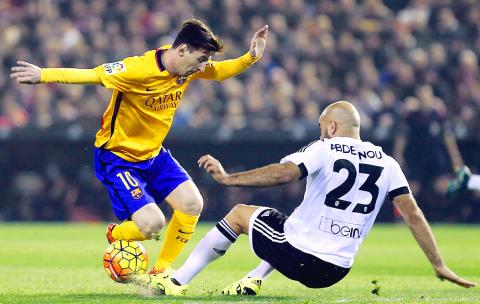
Photo: EPA
Sanfrecce Hiroshima, who qualified as champions of host nation Japan, complete the lineup.
The tournament, successor to the sometimes volatile games in the Intercontinental Cup, is largely unloved and ignored in Europe, yet regarded as the pinnacle for teams in other parts of the world.
South American sides, in particular, spend months preparing and are invariably followed by thousands of fans.
“My feeling is that even though they are finals, the European teams feel that they are going to end up winning,” River Plate midfielder Lucho Gonzalez said. “When they start out feeling that relaxed, they often end up having a tougher test than they expected. For us, though, these kinds of games are like touching the sky.”
The dynamics of modern soccer means that the top South American players are to be playing against, rather than for, their region’s representatives.
While European champions Barcelona are to be fielding Brazil’s Neymar, Uruguay’s Luis Suarez and Argentina’s Messi in a dream strike force, River Plate must make do with mainly journeymen professionals.
River Plate’s team is fairly typical of South American club soccer, where, for many players, a career in Russia, Ukraine, the Middle East or Australia can be preferable to staying in the ramshackle domestic game.
River Plate have three types of players in their squad — youngsters still hoping to move abroad, veterans who have returned home to play out their careers and those who are not good enough to make the move.
Their nickname — the Millionaires — is especially ironic given that their entire squad is worth less than Neymar or Messi alone.
Despite this, River Plate, who have enjoyed a stunning revival under former Argentina midfielder Marcelo Gallardo, are still seen as the main challengers to Barcelona.
Sanfrecce Hiroshima and Auckland City, a team largely made-up of part-time professionals, who last year reached the semi-finals and took South American champions San Lorenzo to extra-time, kick-off the tournament tomorrow.
The winners are to progress to the quarter-finals — of which there are two — where they are to face TP Mazembe in Osaka on Sunday, with River Plate awaiting in the semi-finals.
Mazembe, from DR Congo, became the first African team to reach the final, in 2010, when they stunned Brazil’s Internacional.
Their most easily identifiable player is Kidiaba, who celebrates goals by bouncing around his goalmouth on his backside.
In the other quarter-final, also on Sunday, Club America face Guangzhou, where Scolari is attempting to revive a career that has been blighted by Brazil’s 7-1 defeat by Germany at the FIFA World Cup on home soil last year.
The winners of that match meet Barcelona in the semi-final. Scolari, an old hand in knockout games, would like nothing more than a chance to knock the European champions out of their stride with some of his well-documented spoiling tactics.
Winning the Asian Champions League has already helped Scolari put his awful World Cup behind him.
“I would like to summarize my answer in one sentence: The winners are those who will not give up,” Scolari said. “My next target is the Club World Cup, and why not? Because I have such a great team, great players and a great club and so, of course, we can realize that dream.”
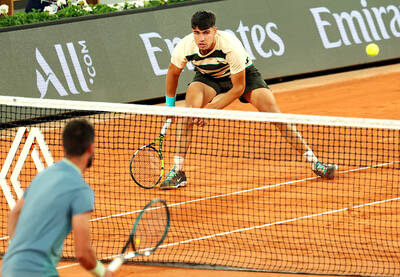
FRUSTRATION: Alcaraz made several unforced errors over four sets against Bosnian Damir Dzumhur, who had never made it past the third round in a major competition Defending champion Carlos Alcaraz reached the fourth round of the French Open after laboring past Damir Dzumhur 6-1, 6-3, 4-6, 6-4 in the Friday night session. The second-seeded Spaniard had never before played Dzumhur, a 33-year-old Bosnian who had never been past the third round at any major tournament. “I suffered quite a lot today,” Alcaraz said. “The first two sets was under control, then he started to play more deeply and more aggressively. It was really difficult for me.” Dzumhur hurt his left knee in a fall in the second round, and had treatment on Friday on his right leg during the
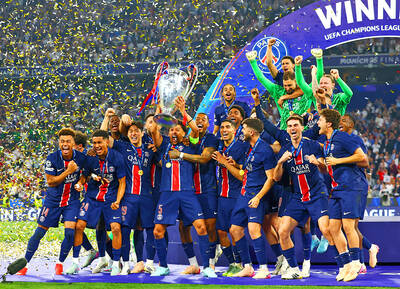
‘DREAM’: The 5-0 victory was PSG’s first Champions League title, and the biggest final win by any team in the 70-year history of the top-flight European competition Paris Saint-Germain won the Champions League for the first time as Luis Enrique’s brilliant young side outclassed Inter on Saturday in the most one-sided final ever with teenager Desire Doue scoring twice in an astonishing 5-0 victory. Doue supplied the pass for Achraf Hakimi to give PSG an early lead and the 19-year-old went from provider to finisher as his deflected shot doubled the advantage in the 20th minute. Doue scored again just after the hour mark, ending any doubt about the outcome before Khvicha Kvaratskhelia ran away to get the fourth and substitute Senny Mayulu, another teenager, made it five. Inter were
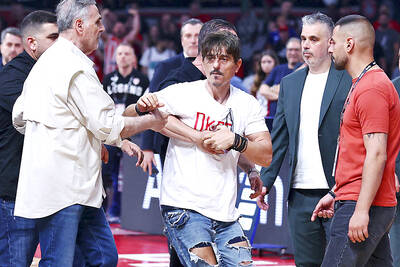
The Greek basketball league finals between Panathinaikos and Olympiakos were suspended by the government on Monday following on-court scuffles involving rival security teams. The best-of-five series is at 1-1. The third game, scheduled for today, has been postponed. The owners of both clubs were summoned to meet with the country’s sports minister. They “will be asked to provide explicit guarantees that this situation will be brought to an end. If not, this year’s championship will be definitively canceled,” government spokesman Pavlos Marinakis said. “There can be no tolerance for such pathological phenomena of violence and delinquency.” In online posts, the owners of Panathinaikos and
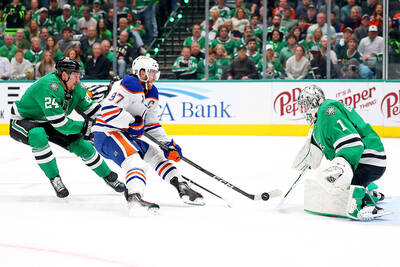
The Edmonton Oilers on Thursday defeated the Dallas Stars 6-3 to book their place in the Stanley Cup Finals, setting up a repeat of last year’s NHL showpiece against reigning champions the Florida Panthers. The Oilers, bidding to become the first Canadian team to win the NHL’s championship series since the 1993 Montreal Canadiens, head to Florida for Game 1 of the best-of-seven series set for Wednesday. Florida, who are to play in the NHL showpiece for the third straight season, won last year’s title 4-3 to extend Canada’s decades-long Stanley Cup drought. Connor McDavid led Edmonton back to the championship series on